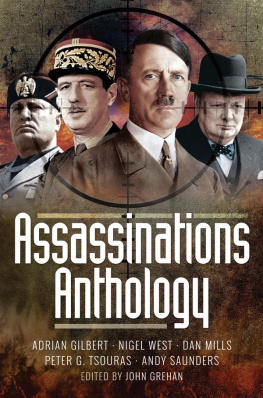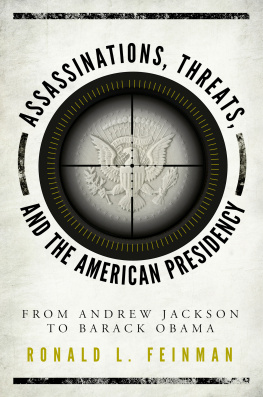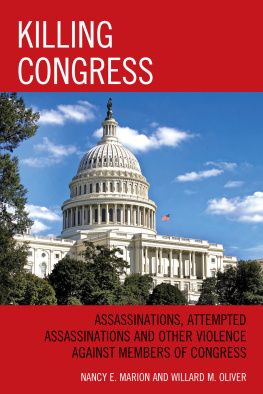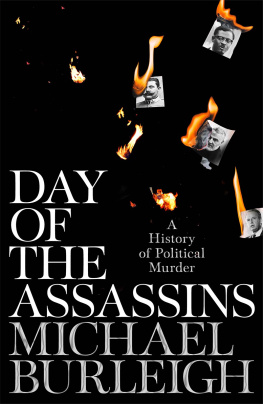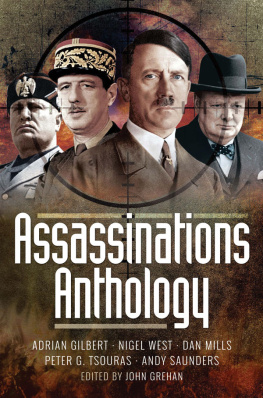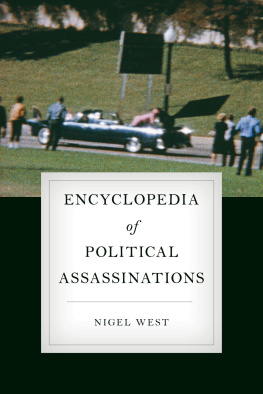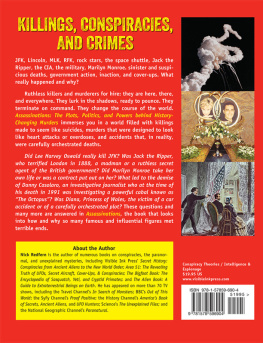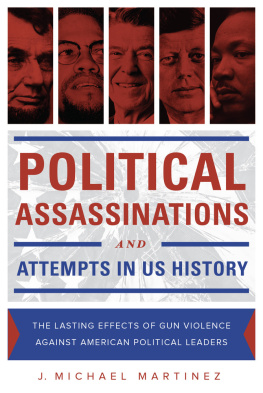ENCYCLOPEDIA OF
ASSASSINATIONS
ENCYCLOPEDIA OF
ASSASSINATIONS
More Than 400 Infamous Attacks
That Changed the Course of History
Carl Sifakis

Copyright 1991, 2001, 2013 by Carl Sifakis
First Skyhorse Edition 2013
All Rights Reserved. No part of this book may be reproduced in any manner without the express written consent of the publisher, except in the case of brief excerpts in critical reviews or articles. All inquiries should be addressed to Skyhorse Publishing, 307 West 36th Street, 11th Floor, New York, NY 10018.
Skyhorse Publishing books may be purchased in bulk at special discounts for sales promotion, corporate gifts, fund-raising, or educational purposes. Special editions can also be created to specifications. For details, contact the Special Sales Department, Skyhorse Publishing, 307 West 36th Street, 11th Floor, New York, NY 10018 or info@skyhorsepublishing.com.
Skyhorse and Skyhorse Publishing are registered trademarks of Skyhorse Publishing, Inc., a Delaware corporation.
Visit our website at www.skyhorsepublishing.com.
10 9 8 7 6 5 4 3 2 1
Library of Congress Cataloging-in-Publication Data is available on file.
ISBN: 978-1-62087-591-9
Printed in China
CONTENTS

For
Thomas Buchleither

INTRODUCTION

Assassination is the extreme form of censorship.
George Bernard Shaw
In 1975 a modest, heavily illustrated book on assassinations appeared in England. It bore a frontispiece quotation of Benjamin Disraeli, from a speech on the death of Abraham Lincoln in 1865, that said, Assassination never changed the history of the world. Ironically, the title of the book was Assassinationsthe murders that changed history.
Do assassinations alter the course of history? There are points to be made on both sides. In a limited sense most of the 10 or so assassinations described in that book did provoke some change. The assassination of archduke Francis Ferdinand altered the history of the world by sparking the Great War of 1914. Yet it is equally true that the assassination was merely the spark, and had it not occurred, another immediate cause would have come to the fore, instead. The forces of militarism and the violent expression of economic drives were not to be denied. The same can be said about the 300-odd assassinations presented in this volume.
Julius Caesar? If the plotters motive was to restore the republic, the assassination was a failure. After only a few years the empire emerged under Octavian, Caesars heir, who became Augustus Caesar.
Abraham Lincoln? Had he lived perhaps the Reconstruction of the Union would have been slightly less painful, but ultimately it was the passage of time that healed the bitter wounds of the American Civil War.
Czar Alexander II? His assassination in all likelihood had no effect on the course of Russian history. It took the radicals several decades to learn that one cannot kill the czar, at least not without replacing him with another.
Despite the bulk of evidence to the contrary, public belief in political conspiracy remains rife. In America that has been true since the attempted assassination of President Andrew Jackson by an obviously deranged individual. Jackson himself went to his grave convinced that his assailant, Richard Lawrence, was but a small cog in an intricate Whig plot to kill him. In fact, American political life has been remarkably free of genuine plots. The weight of the evidence in the assassinations of both Kennedys suggests that they were acts by lone, twisted gunmen. The murder that most readily meets the test of conspiracy is clearly that of Martin Luther King, Jr.
Not that American politics is not heavily into personal violence. The period after the assassination of Lincoln is best summed up by a phrase used by James McKinley in Assassination in AmericaAfter Lincoln, the deluge. While Andrew Johnson held office, 13 political-office holders were shot at and 12 of them were killed. During Ulysses S. Grants terms from 1869 to 1877, there were 20 attacks and 11 fatalities.
Today, assassination remains hardly a dying institution worldwide. Political assassination exists and has existed ever since humankind formed a body politic.
There are two basic types of assassinationanti-establishment murders and establishment murders.
The antiestablishment assassinations are more readily apparent to the average person; they include the acts of deranged individuals or of dedicated revolutionaries. Although deranged assassins may succeed in their search for power and notoriety, revolutionaries generally fail in their goal of altering society. Throughout the 19th century, for example, the Russian radicals killed czars, aristocrats, generals, and police officials, yet oppressive government persisted.
Every nation on earth, regardless of political persuasion, has utilized assassination to achieve political ends. For unlike antiestablishment assassination, state-sponsored assassination can work, if not to change history, at least to slow its tide or, quite frequently, to give the establishment continued momentum. In Terrorism Robert Liston notes that the first American use of state assassination occurred in 1620 among the Puritans who came to Plymouth, Massachusetts. Seeking to solve the Indian problem, Captain Myles Standish invited the local chief, the chiefs 18-year-old brother, and two other braves to his headquarters for a feast.
Once they were inside, Liston writes, the door was locked. Standish personally hacked one Indian to pieces with his knife, while the chief and the other brave were dispatched by other Pilgrims. The Indian youth was spared long enough to be taken outside and publicly hanged as an example to other Indians. This was state assassination in its purest form. Indeed, since every country reserves the right to go to war, in which thousands or even millions of people may be killed, why should the state eschew assassination, especially when such a course could forestall the greater bloodshed of war?
Tyrannicide has been debated throughout history. Aristotles distinction between the altruistic ruler and the self-interested tyrant became standard medieval thought, coupled with the rightfulness of assassination to be rid of a tyrant. Saint Thomas Aquinas differentiated between a usurper, who steals the throne, and a legitimate monarch who misused his or her power. Aquinas could condone the private assassination of a usurper but considered it too perilous to let individuals decide if a properly installed ruler had become a tyrant. In 1415 the Council of Constance condemned a broad defense of tyrannicide but did not exclude its justification under certain circumstances.
By the 16th century the question had assumed life-and-death implications on a broad scale since both Roman Catholics and Calvinists concluded that a ruler who did not hold their religion was automatically a tyrant. In Scotland John Knox held that the defense of his Calvinist faith was all that was necessary to practice assassination. He was puzzled and frustrated when Queen Elizabeth I of England failed to follow his advice forthwith and execute the Catholic Mary, Queen of Scots.
In France Huguenot writers proclaimed the virtues of tyrannicide; French Catholic writers in turn directed their like arguments against kings Henry III and Henry IV (Henry of Navarre). The Spanish Jesuit Juan de Mariana supported the concept in many circumstances and in fact applauded the assassination of Henry III. Marianas teachings were often cited as leading to the murder of the popular Henry IV.
Next page

